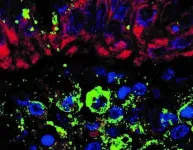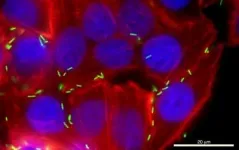(Press-News.org) A study conducted at the University of Campinas (UNICAMP) in the state of São Paulo, Brazil, shows that compounds produced by gut microbiota (bacteria and other microorganisms) during fermentation of insoluble fiber from dietary plant matter do not affect the ability of the novel coronavirus SARS-CoV-2 to enter and replicate in cells lining the intestines. However, while in vitro treatment of cells with these molecules did not significantly influence local tissue infection, it reduced the expression of a gene that plays a key role in viral cell entry and a cytokine receptor that favors inflammation.
An article reporting the findings is published in the journal Gut Microbes.
Up to 50% of COVID-19 patients experience gastrointestinal symptoms such as diarrhea, vomiting, and abdominal pain. Such symptoms are detected in 17.6% of severe cases. They are partly associated with viral entry into intestinal cells resulting in alterations to their normal functions. In addition, recent studies point to major changes in patients’ gut microbiota, including a decrease in levels of bacteria that secrete short-chain fatty acids (SCFAs) by fermenting dietary fiber. SCFAs are important to colon health and maintenance of intestinal barrier integrity.
The researchers decided to confirm whether SFCAs directly affected the infection of intestinal cells by SARS-CoV-2. Previous studies had suggested alterations in gut microbiota and its products could modify an infected subject’s immune response.
“In earlier research, we found in animals that compounds produced by gut microbiota help protect the organism against respiratory infection. The model used there was respiratory syncytial virus [RSV], which causes bronchiolitis [inflammation of the small airways in the lung] and frequently infects children. Similar results have been obtained by other research groups in studies of different respiratory diseases,” said Patrícia Brito Rodrigues, who has a doctoral scholarship from FAPESP and is joint first author of the article with postdoctoral fellow Livia Bitencourt Pascoal. Rodrigues conducted the research as part of her doctorate at UNICAMP’s Institute of Biology (IB) with a scholarship from FAPESP.
In the latest study, healthy colon tissue and epithelial cells were infected with SARS-CoV-2 in the laboratory and subjected to a battery of tests.
“Viral load wasn’t reduced and was the same in cells and tissue treated with SCFAs and in untreated samples. However, treated intestinal biopsy samples displayed a significant decrease in expression of the gene DDX58 [an innate immune system receptor that detects viral nucleic acids and activates a signaling cascade that results in production of pro-inflammatory cytokines] and the interferon-lambda receptor, which mediates anti-viral activity. There was also a decrease in expression of the protein TMPRSS2, which is important to viral cell entry,” said Raquel Franco Leal, a professor at UNICAMP’s School of Medical Sciences (FCM), supported by FAPESP and co-principal investigator for the study with Marco Aurélio Ramirez Vinolo, a professor at IB-UNICAMP, also supported by FAPESP.
Protection against inflammation
The researchers took colon tissue samples from 11 patients without COVID-19. They also tested epithelial cells that line the intestines and are in close contact with gut microbiota. Tissue and cell samples were infected with SARS-CoV-2 in IB-UNICAMP’s Laboratory of Emerging Virus Studies (LEVE), a Biosafety Level III (BSL-3) facility led by José Luiz Proença Módena, a professor at IB-UNICAMP and a co-author of the article.
The tissues and cells were treated with a mixture of acetate, propionate and butyrate, compounds produced by gut microbiota metabolization of SCFAs present in dietary fiber. The treatment did not alter viral load in colon biopsies or cells, nor were there any changes in cell wall permeability and integrity.
“That doesn’t exclude the possibility of significant action by SCFAs on infection by SARS-CoV-2. The anti-viral effects could depend on interaction with other cells in the organism,” Rodrigues said. “We’ll continue our investigation in animal models since the action of these compounds on the infection could depend on a more complete system than the samples we used in vitro [isolated cells and tissues].”
Other tests involving non-treated infected biopsy samples showed an increase in expression of the gene DDX58, which encodes an important viral receptor, and of interferon-beta (IFN-beta), a pro-inflammatory molecule that participates in the cytokine storm associated with severe cases of COVID-19.
“Alterations in genes associated with virus recognition and response during intestinal infection may be relevant to the onset of the inflammatory chain,” Leal said. “In this context, it will be important to deepen the analysis of the effects of SCFAs with these parameters, as this could be significant in severe stages of the disease.”
INFORMATION:
About São Paulo Research Foundation (FAPESP)
The São Paulo Research Foundation (FAPESP) is a public institution with the mission of supporting scientific research in all fields of knowledge by awarding scholarships, fellowships and grants to investigators linked with higher education and research institutions in the State of São Paulo, Brazil. FAPESP is aware that the very best research can only be done by working with the best researchers internationally. Therefore, it has established partnerships with funding agencies, higher education, private companies, and research organizations in other countries known for the quality of their research and has been encouraging scientists funded by its grants to further develop their international collaboration. You can learn more about FAPESP at http://www.fapesp.br/en and visit FAPESP news agency at http://www.agencia.fapesp.br/en to keep updated with the latest scientific breakthroughs FAPESP helps achieve through its many programs, awards and research centers. You may also subscribe to FAPESP news agency at http://agencia.fapesp.br/subscribe.
HERSHEY, Pa. -- Stress, increased free time and feelings of boredom may have contributed to an increase in the number of cigarettes smoked per day during the early months of the COVID-19 pandemic by nearly a third of surveyed Pennsylvania smokers. Penn State College of Medicine researchers said understanding risk factors and developing new strategies for smoking cessation and harm reduction may help public health officials address concerning trends in tobacco use that may have developed as a result of the pandemic.
Jessica Yingst, assistant professor of public health sciences and Penn State Cancer Institute researcher, said smokers who increased the number of cigarettes they smoked per day could be at greater risk of dependence and have a more difficult ...
March 30, 2021 - As cancer survival rates improve, more people are living with the aftereffects of cancer treatment. For some patients, these issues include chronic radiation-induced skin injury - which can lead to potentially severe cosmetic and functional problems.
Recent studies suggest a promising new approach in these cases, using fat grafting procedures to unleash the healing and regenerative power of the body's natural adipose stem cells (ASCs). "Preliminary evidence suggests that fat grafting can make skin feel and look healthier, restore lost soft tissue volume, and help alleviate pain and fibrosis in patients with radiation-induced skin injury ...
Giant trees in tropical forests, witnesses to centuries of civilization, may be trapped in a dangerous feedback loop according to a new report in Nature Plants from researchers at the Smithsonian Tropical Research Institute (STRI) in Panama and the University of Birmingham, U.K. The biggest trees store half of the carbon in mature tropical forests, but they could be at risk of death as a result of climate change--releasing massive amounts of carbon back into the atmosphere.
Evan Gora, STRI Tupper postdoctoral fellow, studies the role of lightning in tropical forests. Adriane Esquivel-Muelbert, lecturer at the University of Birmingham, studies the effects of climate change in the Amazon. The two teamed up ...
PULLMAN, Wash. - Washington State University researchers have discovered a protein that could be key to blocking the most common bacterial cause of human food poisoning in the United States.
Chances are, if you've eaten undercooked poultry or cross contaminated food by washing raw chicken, you may be familiar with the food-borne pathogen.
"Many people that get sick think, 'oh, that's probably Salmonella,' but it is even more likely it's Campylobacter," said Nick Negretti ('20 Ph.D.), a lead member of the research team in Michael Konkel's Laboratory in WSU's School of Molecular Biosciences.
According to a study on the research recently published ...
PROVIDENCE, R.I. [Brown University] -- Researchers from Brown University have discovered a previously unknown type of ancient crater lake on Mars that could reveal clues about the planet's early climate.
In a study published in Planetary Science Journal, a research team led by Brown Ph.D. student Ben Boatwright describes an as-yet unnamed crater with some puzzling characteristics. The crater's floor has unmistakable geologic evidence of ancient stream beds and ponds, yet there's no evidence of inlet channels where water could have entered the crater from outside, and no evidence ...
Judges don't do court stenography. CEOs don't take minutes at meetings. So why do we expect doctors and other health care providers to spend hours recording notes -- something experts know contributes to burnout?
"Having them do so much clerical work doesn't make sense," said Lisa Merlo, Ph.D., an associate professor of psychiatry and director of wellness programs at the University of Florida College of Medicine. "In order to improve the health care experience for everyone, we need to help them focus more on the actual practice of medicine."
Physician burnout affects patients, too. Stressed doctors are less compassionate and more likely to make mistakes. Clinicians who leave the field or cut back hours reduce patient access ...
Mount Sinai researchers have found that a widely available and inexpensive drug targeting inflammatory genes has reduced morbidity and mortality in mice infected with SARS-CoV-2, the virus that causes COVID-19. In a study published today in the journal Cell, the team reported that the drug, Topotecan (TPT), inhibited the expression of inflammatory genes in the lungs of mice as late as four days after infection, a finding with potential implications for treatment of humans.
"So far, in pre-clinical models of SARS-CoV-2, there are no therapies--either antiviral, antibody, or plasma--shown to reduce the SARS-CoV-2 disease burden when administered after more than one day post-infection" says senior author Ivan Marazzi, PhD, Associate Professor of Microbiology ...
Research into the diets of a large number of the world's carnivores has been made publicly available through a free, online database created by a PhD student at the University of Sussex.
From stoats in the UK to tigers in India, users are now able to search for detailed information about the diets of species in different geographical locations around the globe.
Created by doctoral student Owen Middleton, CarniDIET is an open-access database which aims to catalogue the diets of the world's carnivores by bringing together past peer-reviewed research. He hopes it will be a useful resource for conservationists and researchers, as well as educators and nature-lovers alike.
Owen said: "There is so much information out ...
A simple plastic water bottle isn't so simple when it comes to the traditional manufacturing process. To appear in its final form, it has to go through a multi-step journey of synthetic procedure, casting, and molding. But what if materials scientists could tap into the same biological mechanisms that create the ridges on our fingertips or the spots on a cheetah in order to manufacture something like a water bottle?
A research paper titled END ...
Preclinical research from VCU Massey Cancer Center published recently in the Proceedings of the National Academy of Sciences shows that the combination of two existing drugs can exploit the metabolic "hunger" of a particularly aggressive type of neuroblastoma to kill cancer cells without inflicting too much collateral damage to healthy tissue.
Neuroblastoma - a type of cancer that strikes the nervous system of very young children - is one of the deadliest pediatric cancers. And children whose neuroblastoma overexpresses the gene MYCN tend to have the worst prognosis.
While medical advancements have led to high cure ...







